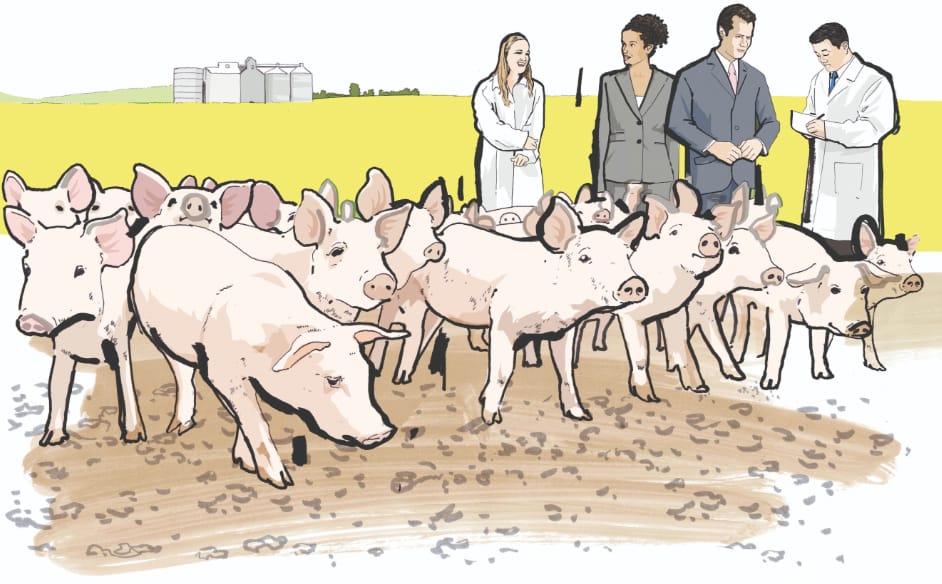It’s no great secret that Wharton attracts and cultivates some of the sharpest minds in nearly every imaginable avenue of the business world. But where, exactly, these avenues are taking those minds these days—that’s where this story takes some surprising twists. From Chinese pig farms to NCAA soccer to dream teams of scientists trying to boost your gym habits, Wharton is engaging in extraordinary cross-disciplinary collaborations. Here, we take a look at a handful of the fresh new paths—and intriguing partnerships—that Wharton students, alumni, and faculty are helping to forge right now.
Pumping Up Pork Farming in China
Swine, business strategy, and the economics of feeding people come together in a fascinating new partnership.

Anne Greenhalgh
Anne Greenhalgh, adjunct professor of management and deputy director of Wharton’s Anne and John McNulty Leadership Program, isn’t exactly a vegetarian, but, well, “I suppose you could say I lean in that direction.” Until last spring, she knew next to nothing about animal protein production. Or pigs. Or pigs in China. And yet she found herself in May of 2017 flying across continents with Penn Vet professor of swine production Thomas Parsons as the business arm of a team aiming to help Chinese pork producers develop improved business models based on more sustainable farming practices and increased consumer trust.
The project, which began for Greenhalgh as a “stretch experience” and an opportunity to spread McNulty’s leadership development across schools, has since become something much more, both on a personal level and in terms of Wharton’s reach. “I’ve come to care very much about this industry,” Greenhalgh says. “If China can do this in a humane, sustainable way that meets the needs of a growing population, it can have an enormous global impact.”

Thomas Parsons
Consider, says Parsons: The Chinese don’t just consume half the world’s pork; they also raise half its pigs. “So when you think about swine, if you’re not in China, you’re not really having an impact.” And Penn Vet has long aimed to improve food production and help develop safe, sustainable, financially viable farming practices around the globe, says professor of animal health economics David Galligan. (Galligan is also the director of the VMD/MBA dual-degree program, which is driven by the startling reality that, as he says, “The world will need to produce more food in the next 50 years than mankind has produced in its entire history.”)
But back to the pigs. As Chinese demand for pork has increased, so has the need for more efficient, sustainable production practices. In 2016, Parsons saw an opportunity in reaching out to the country’s largest pork producers. He wanted to facilitate research-driven dialogues about boosting the industry—not just at the farm level, he says, but also in a wider leadership sense. He wanted science to work in tandem with business.
Wharton was an obvious partner, especially considering the 2015 debut of the Penn Wharton China Center and the expertise that McNulty Leadership could bring to the table. Furthermore, three years’ worth of funding from the Penn China Research and Engagement Fund and a partnership with vet pharma company Zoetis would allow for the continuity that Parsons says is critical to tailoring offerings to what participants want and need.
Thus far, the producers have attended a three-day symposium at the PWCC; traveled to Philadelphia for seminars and tours of American swine production sites; and heard Wharton management professors Michael Useem and Harbir Singh present ideas from their book Fortune Makers: The Leaders Creating China’s Great Global Companies—an incredibly apt fit, says Greenhalgh: “We’ve been able to pick up that thread and start doing case studies on strategic leadership.” This fall, the Penn team plans to return to China, where they’ll look at the use of artificial intelligence in the management of pigs and also discuss branding. “One of the neat things,” Parsons says, “is that you get competitors all sitting in a room, working on a common project.”
His team has been very encouraged by the positive feedback from the Chinese contingent about the project so far. “The leadership aspect really resonates,” Parsons says. “Partnering like this has allowed us to offer new training that will hopefully have impacts as large as or larger than the barn-level training typically provided by veterinarians.”
Boosting Good Behavior … Forever
The Behavior Change for Good Initiative wants to help you make better choices.

Katherine Milkman
When Wharton professor of operations, information, and decisions Katherine Milkman paired up with psychology professor Angela Duckworth to launch the Behavior Change for Good Initiative (BCFG) last year, news of the collaboration popped up everywhere. (Maybe you heard the interviews with the pair on the Freakonomics podcast, or read about them in Financial Times?) It’s easy to see the broad mainstream appeal here: The duo’s research aims to create tools that help people continually make good decisions about important things that folks often struggle with—specifically, their health, financial savings, and education.
The joint Wharton/School of Arts & Sciences initiative began as a proposal for a MacArthur Foundation $100 million grant, inspired by the same puzzle Milkman and Duckworth had been working to solve in separate research projects: how to create enduring behavior change that would improve countless lives. The challenge, as they see it, isn’t a knowledge gap about what human beings should do—we know we should save money and study hard and hit the gym. The challenge is about creating behavior that reflects that knowledge. And that, Milkman says, is “a linchpin to solving so, so many problems.”
Alas, the two didn’t win the $100 million, but they did enlist experts from all sorts of disciplines
—economics, sociology, medicine, psychology, computer science, and more—to join their cause. (As of October, they had 55 researchers from across the country on their “dream team,” including such Wharton luminaries as health care management and medicine professor Kevin Volpp, business economics and public policy professor Judd Kessler, marketing and psychology professor Barbara Mellers, and marketing professor Deborah Small.) They’ve also landed corporate partners and enough funding to go full-throttle. One year later, the team is deep into research in health and education. On the health front, they’ve partnered with 24 Hour Fitness to launch a program called Step Up, enrolling tens of thousands of gym-goers across the chain’s 430 gyms. BCFG researchers are simultaneously testing 20 different ideas about changing people’s gym habits—a mega-study involving trials with rewards, digital communication with participants, and more.

“It’s still early,” Milkman says—the project runs through January 2019—“but we’re far enough along in getting data back to be energized and excited. We’re moving the needle.” Meantime, in addition to the education research Duckworth is leading, the BCFG team plans to soon delve into financial decision-making research with famed behavioral economist Shlomo Benartzi, who was recently appointed as a BCFG distinguished senior fellow.

Dena Gromet
Another exciting development, says BCFG executive director Dena Gromet, is a new class Milkman and Duckworth are teaching to Penn undergraduates this fall—a seminar on the science of behavior change. “There aren’t many other places a student could go for something like this, especially with experts like Angela and Katy,” Gromet says.
As BCFG continues to ramp up in the coming months, Milkman’s more thrilled than ever about its potential impact, both in terms of learning what works for positive, permanent behavior change and seeing what happens when so many esteemed researchers take on a project of this scale. “You know, looking back, when we pitched the idea [for the MacArthur prize], we may have been at too nascent a point,” Milkman says. “But now that we’re doing this, really rolling with the people involved, I do think this project is worthy of $100 million.”
Turning Student Athletes into (Wharton-Trained) Leaders
The Penn Athletics Wharton Leadership Academy offers off-the-field training for Penn teams.

Karin Corbett
Sports culture—actually, culture in general—has changed a lot since Karin Corbett was a kid. The head coach of Penn’s women’s lacrosse team (and one of the university’s winningest, with 11 Ivy League titles in the past 12 years) remembers the old neighborhood pickup games: “There were no adults around. We had to deal with conflict and organization on our own. I think we rob kids of that today. They don’t always have to think for themselves, to be in charge. And so they don’t really come in with these skills.”
That’s not just her observation, she says: “I sit next to coaches while I recruit, and there’s a continuous complaint about a lack of student leadership.” That got her thinking about the success of her own team and that of other teams and businesses. And the more she thought and the more she read, the more Corbett realized how often success seemed to come back to a culture of leadership development.

David Pottruck C70 WG72
At the same time Corbett was mulling this issue, renowned CEO and author David Pottruck C70 WG72 was also thinking about leadership and sports. A former student athlete himself (and namesake of the David Pottruck Health and Fitness Center on campus), Pottruck says he’s always believed in the character development athletics could provide—leader-friendly traits like tenacity, perseverance, and goal-setting. “But as long as we’ve talked about sports and leadership, we’ve always assumed that these lessons were inherent to the experience of being an athlete,” he says. “That it just happened. It occurred to me: Couldn’t we make it happen in a far better way if we combined the conceptual understanding of leadership with the actual experience of athletics? Wouldn’t that produce a more compelling leadership journey for our students?”

In a moment of kismet, both Corbett and Pottruck approached athletic director Grace Calhoun with thoughts on a leadership program for athletes, and from there, the Penn Athletics Wharton Leadership Academy took shape. Pottruck sponsored the program that would give Penn’s athletes access to training from Wharton; Kindred Healthcare CEO Benjamin Breier C93 W93 soon followed suit with additional support. Corbett signed on alongside Pottruck and the McNulty Leadership Program’s executive and deputy directors, Jeff Klein and Anne Greenhalgh—and together, they launched the pilot in 2016, with a handful of team leaders as the first Academy class.

Benjamin Breier C93 W93
In fall of 2017, the first full class launched, made up entirely of freshmen from seven participating teams, including baseball, women’s lacrosse, and field hockey. Monthly seminars focused on a gamut of leadership fundamentals: the concept of responsibility, thought ownership, the value of failure, the second mile vs. the shortcut, keeping different types of people happy and motivated—“the sorts of basic ideas that are important anywhere, on a team and when they graduate and find themselves on a new totem pole,” Corbett says.
This fall, as the Academy enters its second year, 14 teams are involved, and there’s a new sophomore program, too, that builds on past lessons. In 2019, the project will expand to incorporate more teams, more experts, and an opt-in junior-year curriculum; the following year will see still more teams, plus seniors. Pottruck’s long-term vision includes honoring a handful of students as Pottruck Fellows—students who make it through all four years of the program and set themselves apart as “people who demonstrate a desire to contribute, not just receive.” Those students, he says, will become part of a mentoring network for student athletes.
Admittedly, Pottruck says, the Academy is still very young, but across the board, enthusiasm is high. And why not? As Corbett points out, the athletes get expert leadership training and exposure to Wharton, while Pottruck notes that Penn coaches get a new recruiting tool. On the McNulty side of things, Greenhalgh says, Penn Athletics is a great fit because the athletes are “already living this leadership notion we have of acting and then reflecting. So what we have here is an incredible laboratory where we can see whether or not our interactions can make a difference for them.”
Making Smarter Health-Care Decisions With Just a Nudge
Penn Med’s leading-edge Nudge Unit is working to improve the way health-care systems operate.

Mitesh Patel WG09 GR14
If you have the misfortune of, say, spraining your ankle, says Mitesh Patel WG09 GR14, emergency-room medical guidelines suggest you be prescribed no more than 10 to 12 opioid pills for the pain. But when Patel—an assistant professor of health-care management at Wharton, a Leonard Davis Institute senior fellow, and an assistant professor of medicine at the Perelman School—partnered with associate professor of emergency medicine Kit Delgado to consider doctors’ opioid prescription habits, the two noted that the default option on the electronic health records ER doctors use for prescribing was set at 30 pills, not 10. Doctors could change the default, of course, but the system was set up to make the bigger prescription easy and efficient. “So we changed the defaults,” Patel says. “It took 30 seconds to do. And the number of patients who got the guideline amount doubled.”
This experiment—offering decision makers a “nudge” toward making a better prescribing choice in the midst of an opioid crisis—is just one example of the kind of work Patel and his colleagues do inside the Penn Medicine Nudge Unit, an innovative 15-person team that launched in 2016 under Patel’s direction. The goal? To leverage insights from behavioral economics to develop and test nudges that improve both health-care value and outcomes. Another example: When, in 2016, the team changed Penn Med’s system-wide EHR prescription default setting from brand-name to generic, generic prescribing rates increased from roughly 75 percent—the worst rate in the region—to 98.4 percent, the region’s best rate. The change saved upwards of $32 million. “A huge win,” Patel says.

Neither Penn Med nor Patel invented the nudge unit concept; the idea of developing teams that use “choice architecture” to guide people toward desirable decisions took off in the U.K. in 2010, as the government experimented with encouraging things like organ donation and prompt tax payments. But Penn’s unit is the first to be embedded within a health system, with exciting results. Indeed, there are endless opportunities for effective nudges in health care, Patel wrote in a recent paper co-authored by Wharton superstars Kevin Volpp M96 G97 GRW98, director of the Center for Health Incentives and Behavioral Economics, and David Asch GM87 WG89, executive director of the Penn Med Center for Health Care Innovation (both of whom sit on the steering committee of the unit): “The more health-care decisions are made within digital environments where they can be witnessed and their context can easily be reshaped, the more nudging opportunities expand.”
Speaking of expanding: Since its debut, the Penn Med Nudge Unit has blown up both in scale—from three research projects to almost 40, covering everything from using secure medical text messaging to change patient outcomes to gamification for promoting weight loss—and in renown. Patel is flooded with inquiries from Wharton MBAs who want to join his fleet of researchers. And he’s gotten so many requests from health-care researchers and C-suite execs looking to launch their own units that Penn hosted its first medical nudge symposium in September.
Going forward, one of the things Patel is most enthused about is a massive expansion of the opioid-prescribing experiment. Patel and Penn Med assistant professor of health policy and medicine Amol Navathe M07 GRW08 have secured funding to launch the pill-number default project in 2019 across 50-plus ERs and urgent-care facilities that are all part of Sutter Health System, on the West Coast. “We’re doing so much, and there are so many projects I’m excited about,” Patel says. “But our country is going through an opioid epidemic”—and he knows the potential power in the right nudge.
Bringing an Entrepreneurial Spirit—and Savvy—To Education
A new dual-degree program between Wharton and the Graduate School of Education fills a wide gap in the business of learning.

Cindy Liu WG18 GED18
When Cindy Liu WG18 GED18 first applied to Wharton, she planned to use her entrepreneurial management MBA to help her build on her experience in management consulting and in the nonprofit world. As an undergraduate, Liu had set up her own student-run nonprofit focused on providing summer educational programming for underprivileged orphans in China. “I wanted the MBA to help me narrow down how I would serve this population,” Liu says. But after much exploring early in her Wharton tenure, she realized that at the core of all of the complicated needs of the orphan population—“of all children, actually”—is education. “Underprivileged kids and privileged kids aren’t all learning in a way that is the most effective for them,” Liu says. She decided at that point that she wanted to work on a new, innovative model of school focused on personalized, project-based learning, so she sought out the experts at Penn’s Graduate School of Education.

Jenny Zapf
Liu’s exploration would become the official pilot for the dual-degree program between Wharton and the GSE—an idea that had been brewing for a while, says Jenny Zapf, director of the Education Entrepreneurship program, the first of its kind in the world. Inspired by student requests over the years, Zapf and her GSE colleague Bobbi Kurshan had envisioned a Wharton collaboration in which entrepreneurs and business leaders could deepen their understanding of learning and incubate ideas in education and ed tech, while educators would gain the skills to sustain impactful, scalable businesses. Given Liu and her plans, it seemed like time to make it happen. The program formally launched this fall, with three dual-degree Wharton/GSE Entrepreneurship students enrolled.
There are actually two Wharton/GSE dual degrees: education entrepreneurship and education policy. The latter is, not surprisingly, geared toward education-related work in government, nonprofits, consulting, or higher ed. Entrepreneurship tends to appeal to students interested in designing new models and solutions to address some of the hardest problems in education, Zapf explains. “This is a great place to build your business model, to learn about your customers, to understand the education landscape and marketplace and to design a viable product or service,” she says. “You can build out your idea as a capstone project across the one-year program. That’s the secret sauce here—you leave with an idea you can take to the market. It’s very applied learning.”

Liu, who spent a semester at Wharton San Francisco, would fly back for her Philly-based GSE classes on weekends, a setup that worked out quite well, she says. It was out West that she did the majority of her networking among fellow students and other educators. It’s also where she met her partner, the parent of a student whose school—the innovative AltSchool in Palo Alto—was closing. Together, the pair, who shared the vision of personalized learning, decided to create a replacement school. They secured funding; hired staff (many from the defunct school); located a new space; and found a pedigreed partner in the innovative Beijing-based Global ETU family of schools. Their K-8 Imagination Lab School began its inaugural year this fall.
Meantime, following her role in the startup phase of the Imagination Lab School, Liu decided to expand her experience in the innovative-education world still more. She took a job as the director of operations and strategy at Oakland-based Yu Ming, a seven-year-old, 450-student Chinese-immersion charter school with a mission that Liu says reflects her educational philosophies. It’s been a remarkable year for Liu, who says the combined resources of Wharton and GSE proved invaluable. The support of the combined staffs was incredibly helpful, she says, as was networking with students and alumni on both sides. “It was daunting for someone without teaching experience, like me, to enter education, where credentials matter a lot,” Liu says. “I want to be perceived and be truly able to contribute as a real insider. This program equipped me with the credibility I needed and invited me into this meaningful career with valuable connections and resources.”
Christine Speer Lejeune is a freelance writer and editor based in Philadelphia.
Published as “Team Players” in the Fall/Winter 2018 issue of Wharton Magazine.
























